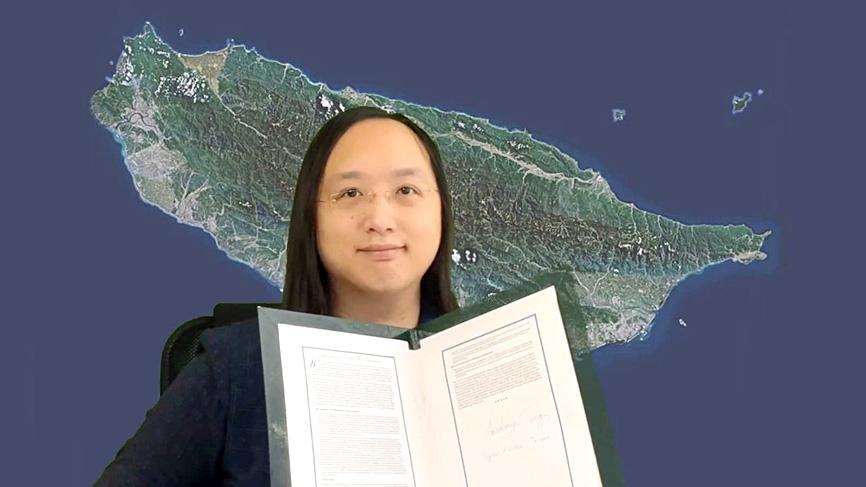Taiwan on Thursday joined dozens of countries in signing a declaration led by the US to promote a free and open Internet to counter “rising digital authoritarianism.”
Minister Without Portfolio Audrey Tang (唐鳳) represented the government at a virtual ceremony hosted by the White House and signed the Declaration for the Future of the Internet.
Other signatories included Australia, Canada, Japan, the UK and the European Commission.

Photo: screenshot from Facebook
Tang yesterday wrote on Facebook that it remained an urgent task for democratic nations to build an Internet environment where economic and social development is encouraged, and democratic values and individual rights are protected.
Taiwan has much to contribute to the task taken on by the declaration’s signatories, Tang added.
The Ministry of Foreign Affairs said that the nation’s participation in the initiative was the latest example of the close partnership between Taiwan and the US, and of US support for Taiwan’s engagement in international affairs.
It also said in a statement that Taiwan would continue working with like-minded countries to contribute to efforts to tackle global challenges.
Sixty countries have endorsed the declaration, which aims to “support a future for the Internet that is open, free, global, interoperable, reliable and secure, and affirm their commitment to protecting and respecting human rights online and across the digital world,” a White House statement said.
The US and its partners through the initiative would work to tackle what they described as “rising digital authoritarianism,” the statement said, adding that some countries had acted to repress freedom of expression, censor independent news sites, interfere with elections, promote disinformation and deny their citizens other human rights.
Signatories are committed to protecting human rights and the fundamental freedoms of all people while strengthening a multistakeholder approach to governance that keeps the Internet available for the benefit of all, the statement said.
Countries that backed the declaration agreed to promote a global Internet that advances the free flow of information and trust in the global digital ecosystem, including through protection of privacy, the statement said.
The signatories would also strive to advance inclusive and affordable connectivity so that all people can benefit from the digital economy, it added.
European Commission President Ursula von der Leyen said of the declaration in a separate statement that “the future of the Internet is also the future of democracy, of humankind.”
“Like-minded countries from all over the world are setting out a shared vision for the future of the Internet, to make sure that the values we hold true offline are also protected online, to make the Internet a safe place and trusted space for everyone, and to ensure that the Internet serves our individual freedom,” she added.

A preclearance service to facilitate entry for people traveling to select airports in Japan would be available from Thursday next week to Feb. 25 at Taiwan Taoyuan International Airport, Taoyuan International Airport Corp (TIAC) said on Tuesday. The service was first made available to Taiwanese travelers throughout the winter vacation of 2024 and during the Lunar New Year holiday. In addition to flights to the Japanese cities of Hakodate, Asahikawa, Akita, Sendai, Niigata, Okayama, Takamatsu, Kumamoto and Kagoshima, the service would be available to travelers to Kobe and Oita. The service can be accessed by passengers of 15 flight routes operated by

MORE FALL: An investigation into one of Xi’s key cronies, part of a broader ‘anti-corruption’ drive, indicates that he might have a deep distrust in the military, an expert said China’s latest military purge underscores systemic risks in its shift from collective leadership to sole rule under Chinese President Xi Jinping (習近平), and could disrupt its chain of command and military capabilities, a national security official said yesterday. If decisionmaking within the Chinese Communist Party has become “irrational” under one-man rule, the Taiwan Strait and the regional situation must be approached with extreme caution, given unforeseen risks, they added. The anonymous official made the remarks as China’s Central Military Commission Vice Chairman Zhang Youxia (張又俠) and Joint Staff Department Chief of Staff Liu Zhenli (劉振立) were reportedly being investigated for suspected “serious

ENHANCING EFFICIENCY: The apron can accommodate 16 airplanes overnight at Taoyuan airport while work on the third runway continues, the transport minister said A new temporary overnight parking apron at Taiwan Taoyuan International Airport is to start operating on Friday next week to boost operational efficiency while the third runway is being constructed, the Ministry of Transportation and Communications said yesterday. The apron — one of the crucial projects in the construction of the third runway — can accommodate 16 aircraft overnight at the nation’s largest international airport, Minister of Transportation and Communications Chen Shih-kai (陳世凱) told reporters while inspecting the new facility yesterday morning. Aside from providing the airport operator with greater flexibility in aircraft parking during the third runway construction,

American climber Alex Honnold is to attempt a free climb of Taipei 101 today at 9am, with traffic closures around the skyscraper. To accommodate the climb attempt and filming, the Taipei Department of Transportation said traffic controls would be enforced around the Taipei 101 area. If weather conditions delay the climb, the restrictions would be pushed back to tomorrow. Traffic controls would be in place today from 7am to 11am around the Taipei 101 area, the department said. Songzhi Road would be fully closed in both directions between Songlian Road and Xinyi Road Sec 5, it said, adding that bidirectional traffic controls would